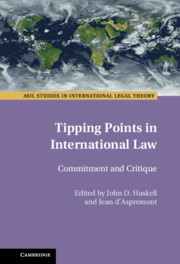Book contents
- Tipping Points in International Law
- ASIL Studies in International Legal Theory
- Tipping Points in International Law
- Copyright page
- Contents
- Contributors
- Acknowledgments
- 1 Experiencing Tipping Points in International Law
- 2 The Literary Performances of the Tipping Point
- 3 Authoritarianism
- 4 China
- 5 Democracy
- 6 Development
- 7 Digital
- 8 Environment
- 9 Health
- 10 Human Rights
- 11 Labor
- 12 Liberation
- 13 Multilateralism
- 14 Race
- 15 Religion
- 16 Rule of Law
- 17 Russia
- 18 Systems
- 19 Territory
- 20 United Nations
- 21 Universalism
- Index
21 - Universalism
Published online by Cambridge University Press: 23 October 2021
- Tipping Points in International Law
- ASIL Studies in International Legal Theory
- Tipping Points in International Law
- Copyright page
- Contents
- Contributors
- Acknowledgments
- 1 Experiencing Tipping Points in International Law
- 2 The Literary Performances of the Tipping Point
- 3 Authoritarianism
- 4 China
- 5 Democracy
- 6 Development
- 7 Digital
- 8 Environment
- 9 Health
- 10 Human Rights
- 11 Labor
- 12 Liberation
- 13 Multilateralism
- 14 Race
- 15 Religion
- 16 Rule of Law
- 17 Russia
- 18 Systems
- 19 Territory
- 20 United Nations
- 21 Universalism
- Index
Summary
International law purports to be universal, applicable everywhere and binding on all people and states. This “law of nations” begins, as Henry Wheaton famously insisted, with “those rules of conduct which reason deduces as consonant to justice, from the nature of the society existing among independent nations.” Thus international law transcends, claims to transcend, or at least should transcend culture, religion, and all other transient elements of human difference to protect our shared humanity, and all of this would be true, as Hugo Grotius persuasively observed, even if we were to concede (etiamsi daremus) that there is no divine sanction for these universal truths. The very concepts of international law, the law of humanity, and the law of nations assume and require recognition that “the inherent dignity” and “the equal and inalienable rights of all members of the human family” are indeed “the foundation of freedom, justice and peace in the world.”
- Type
- Chapter
- Information
- Tipping Points in International LawCommitment and Critique, pp. 362 - 372Publisher: Cambridge University PressPrint publication year: 2021

